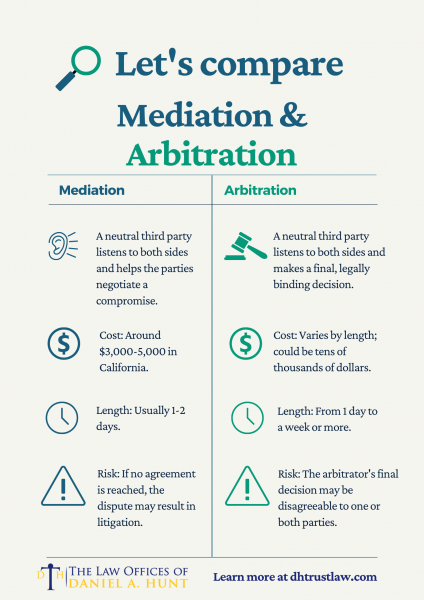Mediation vs. Arbitration

Mediation vs. arbitration: what are they and which option is right for you? When conflict arises in a trust administration, some trustees and beneficiaries try mediation or arbitration before or instead of filing a formal lawsuit. Mediation and arbitration are two forms of alternative dispute resolution (ADR). Both provide a way to privately resolve the conflict outside of a public court proceeding. ADRs can be quicker and less expensive alternatives to an expensive formal lawsuit.
What is Mediation?
Mediation is an informal arrangement in which a neutral third party acts as a mediator between the two (or more) conflicting parties. Each party attends a scheduled mediation with their attorney (if they have retained one) and presents their side. The mediator offers suggestions to help resolve the dispute.
While most mediators are attorneys or retired judges, they are not supposed to give legal advice. Mediators do not issue orders, find fault, or make determinations. They do not have the authority to make legally-binding decisions for the parties, but rather serve as a guide for the negotiations.
Common Steps of Mediation
Mediation doesn’t follow a formal process like arbitration or a court proceeding. But mediations often follow these basic steps:
- The mediator introduces themself and explains the rules and goals of mediation.
- Each party gets the chance to explain the conflict as they see it without interruption from the other party.
- The mediator often meets individually with each party, going back and forth to work out the issues.
- If an agreement is reached, the mediator writes it down and all parties sign the agreement, including attorneys if they’ve retained legal counsel.
- If an agreement is not reached, the mediator may conclude by summarizing the points on which the parties did agree and advise them of their next steps.
Pros and Cons of Mediation
Mediation is usually the most cost-effective approach to dispute resolution. The cost for mediation is around $3,000- $5,000 in California for a full day, while trust litigation in the form of a trial can cost many times more than that amount. The process tends to be relatively quick, often lasting only a day or two.
Mediation invites both parties to actively participate in finding a solution they find acceptable. This offers the parties more control over the outcome than arbitration or a court proceeding, where an arbitrator or judge makes the final decision.
The downside to mediation is that it does not always yield a resolution to the conflict. Typically in mediation, there is no winner or loser. If the parties fail to reach a mutually-agreed-upon solution, then the matter may proceed to litigation.
What is Arbitration?
Compared with the informality of mediation, arbitration follows more formal rules of procedure. Both parties should agree on the chosen arbitrator, who should have some degree of experience with trust and estate law.
Like a mediator, an arbitrator is a neutral third party who listens to both parties present their side. Unlike a mediator, an arbitrator makes a decision that is typically legally binding to both parties.
Commons Steps of Arbitration
The arbitration process generally follows the following steps:
- One party sends a document called “Request for Arbitration” or “Notice to Arbitrate” to the other party. This document sets forth the nature of the conflict in writing.
- The other party has a period of time to respond in writing and indicate if they agree to resolve the dispute via arbitration. If so, the arbitration process begins.
- Both parties should select a mutually agreeable arbitrator.
- The arbitration will involve one or more hearings before an arbitrator. Both parties’ lawyers may present their arguments and have the chance to question the other party’s witnesses and experts.
- After the hearing, the arbitrator offers a legally binding decision (assuming binding arbitration has been selected) that determines the rights and obligations of the parties.
Pros and Cons of Arbitration
Because the arbitrator’s decision is final, arbitration eliminates the risk of a formal court proceeding. But the arbitrator may make a decision that is disagreeable to one or both parties. In our experience, both parties often walk away feeling that the decision made was unfair. The decision is often arbitrary, as the name indicates.
Arbitration is typically more expensive than mediation. Depending on the length of the arbitration, the cost could be tens of thousands of dollars. An arbitration may last anywhere from one day to a week or more.
Both mediation and arbitration offer benefits and risks to those experiencing conflict in a trust or estate administration. Our office typically recommends mediation as a superior option over arbitration, although individual circumstances may vary.
For more information on resolving trust and estate conflicts through mediation and arbitration, feel free to contact our office. If you need a referral to an experienced mediator for a trust/estate matter, check out our Referral Hub or try the American Arbitration Association’s Find a Mediator tool.
Law Offices of Daniel A. Hunt
The Law Offices of Daniel A. Hunt is a California law firm specializing in Estate Planning; Trust Administration & Litigation; Probate; and Conservatorships. We've helped over 10,000 clients find peace of mind. We serve clients throughout the greater Sacramento region and the state of California.




